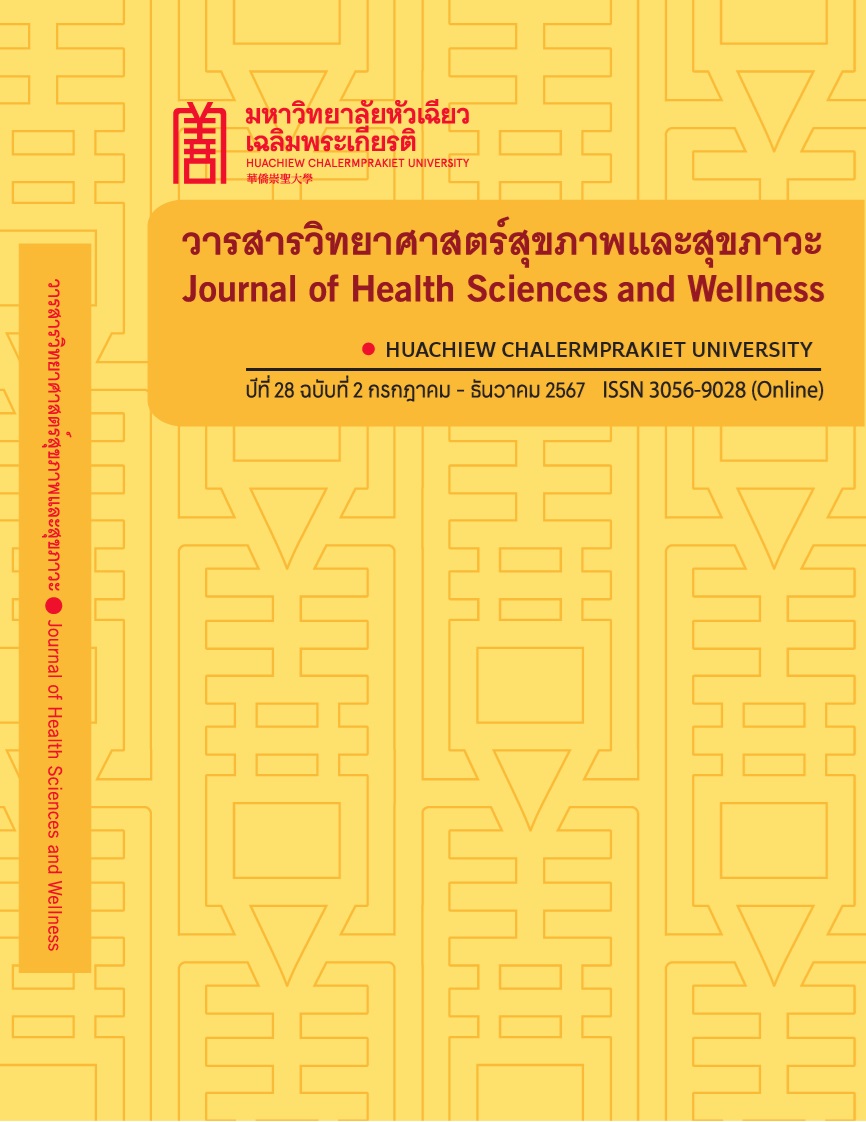Correlation between working memory and mental health of the senior physical therapy students during online learning in the Covid-19 situation
Keywords:
Working memory, Stress, Anxiety, Depression, Covid-19Abstract
The objective of the study was to explore the problems of mental health including depression, anxiety, and stress among senior physical therapy students during online learning in the Covid-19 situation. In addition, the correlation between working memory and mental health was to be determined. The sixty-eight participants were senior physical therapy students aged 22.60 ± 0.10 years old. The digit span test was used to assess working memory. Also, the depression anxiety stress scale (DASS-21) was used to measure the mental health of all participants. All data were analyzed using a descriptive statistic, and correlation was identified by Spearman’s correlation coefficient. The study reported normal levels of mental health state in depression, anxiety, and stress at 75.00%, 69.10% and 91.20% of all participants respectively. Moreover, the results found anxiety from mild to extremely severe level at 30.90% of all participants followed by depression and stress from mild to severe level at 25.00% and 8.80%. The percentile of working memory of all participants was 78.71 ± 12.83. However, the working memory was not significantly different among various levels of anxiety (p = 0.85), depression (p = 0.64), and stress (p = 0.55). Although most senior physical therapy students had a normal level of mental health. there were a few students who suffered from a mental health problem. Therefore, you should be aware of this problem to watch out for it in a timely manner.
Downloads
References
Chootong R, Wiwattanaworaset P, Buathong N, Noofong Y, Chaithaweesup P, Cheecharoen P, et al. Mental health status, family state and family functioning of undergraduate students in a Southern University, Thailand. J Psychiatr Assoc Thailand. 2019;64(4):337–50. (in Thai)
Rohitsathien B. The Ministry of Education of Thailand has ordered educational institutions across the country to close for special reasons to prevent the spread of COVID-19 [internet]. 2020 [cited 2021 Nov 7]. Available from: https://moe360.blog/2020/03/17/ (in Thai)
Moawad RA. Online learning during the COVID- 19 pandemic and academic stress in university students. Rev Romaneasca Pentr. 2020;12(1Sup2):100–7. doi:10.18662/rrem/12.1sup2/252.
Li Y, Wang A, Wu Y, Han N, Huang H. Impact of the COVID-19 pandemic on the mental health of college students: a systematic review and meta-analysis. Front Psychol. 2021;12:669119. doi:10.3389/fpsyg.2021.669119.
Prasertsong C, Sanghirunruttana J, Kladkaew P. The factor related to stress of online learning due to the COVID-19 situation among nursing students. J Somdet Chaopraya Inst Psychiat. 2021;15(1):14–28. (in Thai)
Thaithani P. Stressful experiences related to executive function deficits of undergraduate students. Srinakharinwirot Acad J Educ. 2017;18(2):75–96. (in Thai)
Phornchirasilp S. Stress and stress coping [internet]. 2011 [cited 2021 Nov 7]. Available from: https://pharmacy.mahidol.ac.th/th/service-knowledge-article-info.php?id=47 (in Thai)
Ajilchi B, Nejati V. Executive functions in students with depression, anxiety, and stress symptoms. Basic Clin Neurosci. 2017;8(3):223–32. doi:10.18869/nirp.bcn.8.3.223.
Diamond A. Executive functions. Annu. Rev. Psychol. 2013;64:135–68. doi:10.1146/annurev-psych-113011-143750.
Blankenship TL, O'Neill M, Ross A, Bell MA. Working memory and recollection contribute to academic achievement. Learn Individ Differ. 2015;43:164-169. doi: 10.1016/j.lindif.2015.08.020.
Anumat P, Haenjohn J, Supwirapakorn W. The effects of working memory training program on senior high school students. J Educ Measurement MSU. 2018;24(2):143–52. (in Thai)
Minear M, Shah P. Sources of working memory deficits in children and possibilities for remediation. working memory and education. Burlington: Academic Press; 2006. P.273-307.
Atkins PWB, Baddeley AD. Working memory and distributed vocabulary learning. Appl Psycholinguist. 1998;19(4):537–52. doi: 10.1017/S0142716400010353.
Oducado RM, Estoque H. Online learning in nursing education during the COVID-19 pandemic: stress, satisfaction, and academic performance. J Nurs Pract. 2021;4(2):143-53. doi:10.30994/jnp.v4i2.128.
Zhang Y, Boemo T, Qiao Z, Tan Y, Li X. Distinct effects of anxiety and depression on updating emotional information in working memory. Int J Environ Res Public Health. 2022;20(1):544. doi:10.3390/ijerph20010544.
Yamane T. Statistics, an introductory analysis. 3rd ed. New York: Harper and Row; 1973.
Oei TP, Sawang S, Goh YW, Mukhtar F. Using the depression anxiety stress scale 21 (DASS-21) across cultures. Int J Psychol. 2013;48(6):1018–29. doi:10.1080/00207594.2012.755535.
Turner M, Ridsdale J. The digit memory test. Baltimore, MD: Dyslexia Int; 2004.
Mingprasert A, Sheng KD. A study of mental health and the stress of undergraduate students in Faculty of Pharmacy at Rangsit University. J Soc Sci Hum. 2014;40(2):211–27. (in Thai)
Abo Hamza E, Helal A. Examining the stress, depressive thoughts, and working memory capacities of the university students. J Educ Gifted Young Sci. 2021;9(2):91-105. doi:10.17478/jegys.862904.
Lewis RS, Nikolova A, Chang DJ, Weekes NY. Examination stress and components of working memory. Stress. 2008;11(2):108–14. doi:10.1080/10253890701535160.
Lukasik KM, Waris O, Soveri A, Lehtonen M, Laine M. The relationship of anxiety and stress with working memory performance in a large non-depressed sample. Front. Psychol. 2019; 10:4. doi:10.3389/fpsyg.2019.00004.
Shields GS, Ramey MM, Slavich GM, Yonelinas AP. Determining the mechanisms through which recent life stress predicts working memory impairments: precision or capacity? Stress. 2019;22(2):280–85. doi:10.1080/10253890.2018.1556635.
Jena SK, Acharya M. Assessment of examination stress on working memory in medical students. Int J Clin Exp Physiol. 2020;7(1):14–7. doi:10.5530/ijcep.2020.7.1.4.
Woo E, Sansing LH, Arnsten AFT, Datta D. Chronic stress weakens connectivity in the prefrontal cortex: architectural and molecular changes. Chronic Stress. 2021;5:1-22. doi:10.1177/24705470211029254.
Downloads
Published
How to Cite
Issue
Section
License
Copyright (c) 2024 Journal of Health Sciences and Wellness

This work is licensed under a Creative Commons Attribution-NonCommercial-NoDerivatives 4.0 International License.
บทความที่ได้รับการตีพิมพ์เป็นลิขสิทธิ์ของวารสารวิทยาศาสตร์สุขภาพและสุขภาวะ
ข้อความที่ปรากฏในบทความแต่ละเรื่องในวารสารวิชาการเล่มนี้เป็นความคิดเห็นส่วนตัวของผู้เขียนแต่ละท่านไม่เกี่ยวข้องกับมหาวิทยาลัยหัวเฉียวเฉลิมพระเกียรติ และคณาจารย์ท่านอื่นๆในมหาวิทยาลัยฯ แต่อย่างใด ความรับผิดชอบองค์ประกอบทั้งหมดของบทความแต่ละเรื่องเป็นของผู้เขียนแต่ละท่าน หากมีความผิดพลาดใดๆ ผู้เขียนแต่ละท่านจะรับผิดชอบบทความของตนเองแต่ผู้เดียว




